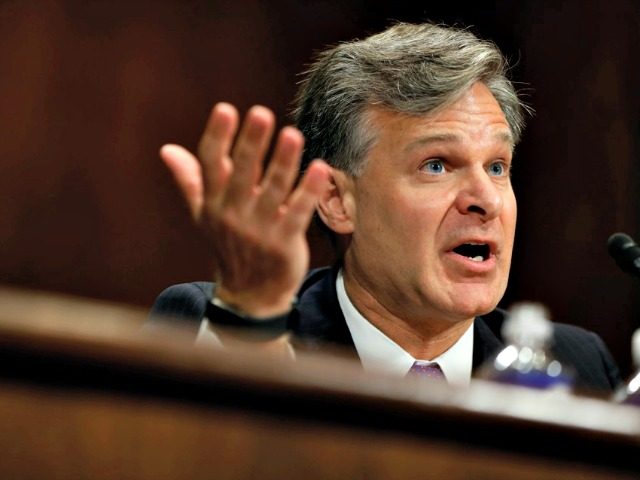Christopher Wray, President Donald Trump’s pick to succeed James Comey as director of the FBI, appeared before the Senate Judiciary Committee Wednesday, the first step in his campaign for Senate confirmation.
Wray repeatedly answered committee members; requests for assurance as to his commitment to a politically independent FBI. Ranking Democrat Sen. Diane Feinstein (D-CA), for example, devoted much of her opening statement to the controversy surrounding Comey’s firing in May, emphasizing the need for a politically independent director.
After being introduced in glowing terms by former Sen. Sam Nunn (D-GA), Wray told the committee, “If I am given the honor of leading this agency, I will never allow the FBI’s work to be driven by anything other than the facts, the law, and the impartial pursuit of justice. Period. Full stop. My loyalty is to the constitution and the rule of law.”
Wray reiterated this pledge when questioned by Sen. Patrick Leahy (D-VT). Wray confirmed that no one in the administration had asked him for a “loyalty oath” of the type supposedly demanded of Comey, telling Leahy that, “My loyalty is to the constitution, the rule of law, and the mission of the FBI. No one has asked me for any kind of loyalty oath at any point in this process and I sure as heck didn’t offer one.”
During her questioning of Wray, Sen. Feinstein asked if Wray had had any discussions with administration officials about Comey’s firing. He replied that he had not and that the only meeting he had on the topic was one with Deputy Attorney General Rod Rosenstein at which Rosenstein “made the observation” that the appointment of Robert Mueller as special counsel to investigate the matter, an act in which Rosenstein was instrumental, “made for a better landscape for me to consider taking on this position.”
Feinstein also extracted, based on Wray’s involvement in the George W. Bush Department of Justice at the time of John Yew’s memos authorizing “enhanced interrogation techniques” were issued, a pledge Wray would stifle any effort to introduce “torture” in the FBI’s practices.
Judiciary Committee Chairman Chuck Grassley (R-IA) opened the hearing, listing Wray’s qualifiations and discussing the challenges, including terrorism and whistle-blower protection, that the FBI would face in his tenure. Grassley then brought to the committee’s attention the current acting Director Andrew McCabe, the man who Wray would replace, and his links to the Clintons and the Democratic Party, saying:
James Comey said that people at the FBI don’t give a rip about politics but Comey installed as his deputy director a man whose wife ran for the Virginia State Senate and accepted almost a million dollars from Virginia Governor Terry McAuliffe’s political machine … Governor McAuliffe is a long-time friend and fundraiser for the Clintons and the Democratic party. Deputy Director Andrew McCabe met in person with Governor McAuliffe about his wife’s political plans … the office of the Special Counsel is reviewing whether that co-ordination was a violation of the Hatch Act.
Sen. Lindsay Graham (R-SC) used his time to focus on Russia, a long-time focus of his. He questioned Wray about the email chain Donald Trump, Jr. released Tuesday, showing someone claiming to have information from a Russian government source. Asked if Graham should take a meeting similar to the one proposed in the email chain to Donald Trump, Jr., Wray responded that, “I would think you’d want to consult with some good legal advisors before you did that.”
Graham asked Wray repeatedly if all political campaigns ought to immediately contact the FBI on the offer of any assistance from a foreign source. Wray declined to be so categorical, saying only that “It would be wise to let the FBI know.” When Graham continued to press, asking Wray to tell the committee they ought to contact the FBI in such circumstances, Wray said, “Any threat or effort to interfere with our elections from any nation state or any non-state actor is the kind of thing the FBI would want to know.”
Graham continued to press Wray on Russia, asking him, “Is Russia our friend or our enemy?”
Wray said only that “Russia is a foreign nation that we have to deal with very warily,” and that he had no reason to doubt intelligence community assessments about Russian election interference.
A graduate of both Yale University and Yale Law School, Christopher Wray was called in by the administration from private practice as a partner at the prestigious law firm King and Spaulding. If confirmed as FBI director, his new post would represent a return to government service. Wray previously was an assistant U.S. attorney, serving as a line prosecutor in the Northern District of Georgia. He then moved into main DOJ during the George W. Bush administration, serving as associate deputy attorney general and principal associate deputy attorney general before being picked to head the Criminal Division in 2003.

COMMENTS
Please let us know if you're having issues with commenting.